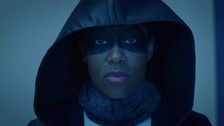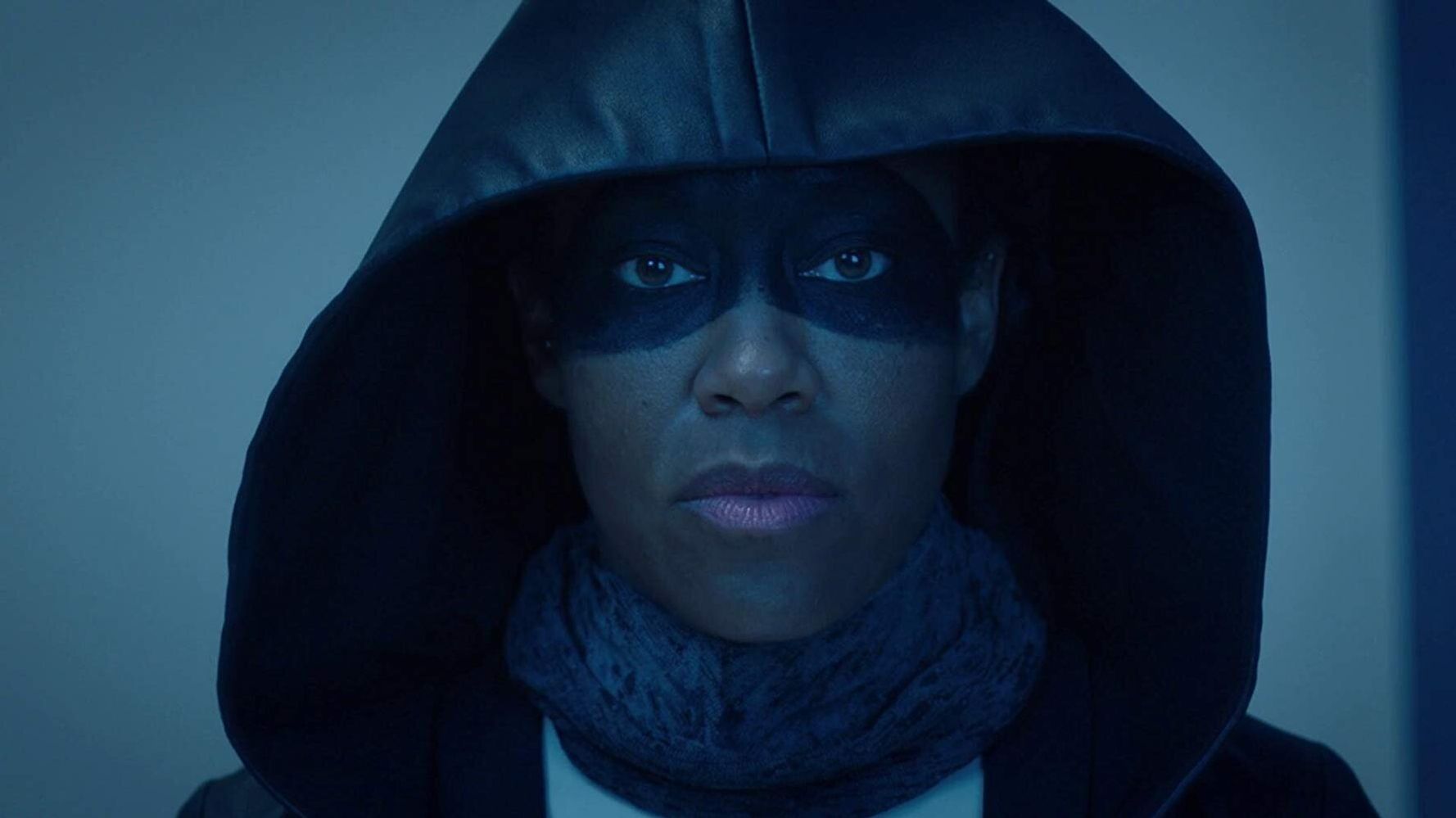[ad_1]

Over the weekend, in celebration of Juneteenth and in recognition of the anti-racist protests across the nation, HBO made all nine episodes of its acclaimed limited series “Watchmen” available to watch for free.
During its original run on the cable network in October, “Watchmen” became one of the most discussed, most debated and most scrutinized shows on television. It was lauded for its diverse cast led by Regina King, its unflinching exploration of race in the United States and its imaginative expansion of the world created in Alan Moore’s 1987 graphic novel of the same name.
Then, in May, the deaths of several Black people — including Ahmaud Arbery, George Floyd, Breonna Taylor and Tony McDade — sparked protests against police brutality and white supremacy all over the country. Suddenly, people who had perhaps never even considered the idea before were calling for state governments to defund and/or abolish the police. “Watchmen,” with its masked police officers, violent vigilantes and secret white supremacist societies, felt more timely and more prescient to some people than ever before.
With new consideration of the show, however, comes new questions. Long-running reality series like “Live PD” and “Cops” have been canceled. Even seemingly lighthearted comedies, such as “Reno 911!” and “Brooklyn Nine-Nine,” have been criticized for perpetuating the idea that the police are just “good guys” who operate without racial bias. Amid calls to defund the police, where does “Watchmen” fall on the spectrum of ”copaganda”?
It is true that many of the moving cogs and gears of “Watchmen” could fall under that category. After all, the character we’re being asked to root for, Angela Abar, is presented to us as a “good cop,” although she often takes the law into her own hands with brutal violence and without impunity. As the masked Sister Night, she uncovers the clandestine racist plots at the center of the Tulsa police force and government and, with a little help from her friends, eradicates key members of the secret racist orders known as Cyclops and Seventh Kavalry. This arc seems to suggest that systemic racism in policing can be fixed when “good cops” like Angela get rid of “bad cops.”
But “Watchmen” could also be read as a case for abolition. It sets up a world in which we’re repeatedly shown that “good cops” and policing as we know it is not enough to fix the ills of white supremacy. Police brutality, which is a function of white supremacy, has largely been seen as the result of a few “bad cops.” What this paradigm does is place the work of ending police brutality on a few good cops. But as we saw with the death of George Floyd and so many others, just because someone isn’t an active participant in violence doesn’t mean they aren’t complicit. In that sense, “Watchmen” did not “predict the future,” as so many people have been saying. Instead, it laid out the ways in which history repeats itself when we mistake reform for actual progress.
The first episode of “Watchmen” begins with a scene in which a young Black child gets indoctrinated with “copaganda.” This sets up the pitfalls of assuming that elevating the oppressed to positions of power within a corrupt system is actually tantamount to progress or justice. I’ve seen that in “Mad Men,” another show about race in America (although it doesn’t know it), which opens with “difficult man” Don Draper having a casual but deeply telling conversation with a Black waiter. It’s telling in a way that he is oblivious to. The opening scene of “Watchmen” is also a deeply telling conversation, one between 5-year-old Will Reeves and a movie screen.
In the scene, Will is seated in an empty theater, eyes wide with excitement, watching a silent film about Bass Reeves, the first Black deputy U.S. marshal west of the Mississippi River. Will’s mother nervously plays a piano to accompany the film as Bass Reeves heroically arrests a corrupt white sheriff on-screen. The white townspeople demand that the disgraced sheriff be lynched.
“No! There will be no mob justice here today,” little Will Reeves mouths along with Bass Reeves in the film. He’s clearly seen this movie many times. He exclaims with pride, “Trust in the law!”
On the surface, this moment establishes a simple but powerful idea that has been at the center of many cop narratives in the media and forms Will Reeves’ core emotional wound: the idea that one good (Black) cop is enough to fix a broken system. But then, we hear bombs in the distance and watch little Will Reeves and his family flee the theater and run into the streets of Greenwood, where the 1921 Tulsa Massacre plays out in brutal and disturbing detail, a stark juxtaposition with the almost utopian world Will saw on screen.
In the second major opening scene, a Black police officer is gunned down by a member of the clandestine white supremacist organization Seventh Kavalry — essentially because of the “rules” put in place to curb police brutality. The Black cop needs permission from dispatch to remove his gun from a magnetic holster, but the response comes too late. The scene seems to suggest that reform could very well endanger the lives of “good” cops.
Episode 6, the jewel of the limited series, reveals that little Will Reeves grows up to be not only a police officer, but actually the mysterious Hooded Justice, the first masked superhero in the “Watchmen” universe (and also Angela’s grandfather). We learn that Reeves wears not only a mask but also white makeup around his eyes in order to become a vigilante. The Hooded Justice reveal cements the idea that part of being a hero is being white. If he had tried to become a vigilante as a Black man, he would have been cast as the villain. And yet, historically, vigilantism has wreaked the most havoc on Black communities like Greenwood.
As Hooded Justice, he fights the order of the Cyclops and prevents them from carrying out a truly wild plot of hypnotizing Black people into acts of mass violence against themselves. However, decades later, a more potent, more insidious form of the racist organization takes form within the police force.
There’s a tension at the heart of “Watchmen” that echoes the overall tension in how we’ve been led to think about policing in America — this tension between the truth and the desire to tell a “good cop story. ” It’s also about anger — what to do with it, where to stash it. It’s about inheritance — the inheritance of whiteness, the inheritance of trauma, the inheritance of the past. Angela becomes a cop for many of the same reasons her grandfather became a cop — as a way to channel the anger of her childhood, the anger of losing her parents and her grandmother, the anger she inherited as a Black American woman, the anger that comes from living in a racist society.
At the end of the series, Angela Abar drinks the egg left by her love, Dr. Manhattan, and takes one hesitant, almost hopeful step out over her pool before the shot quickly cuts to black. The ending doesn’t mean that the only solution to the problem of police brutality is one “good” cop receiving godly powers. Angela’s arc is key: Throughout the show, she is literally awakened to the fact that the system in she put so much faith is broken and indeed was not made to protect her or the people she loves. She also realizes all of the ways in which she has been unknowingly complicit in that system.
What does it mean to “trust in the law” when there is no law? When you are the law?
“Before we can dismantle oppressive systems we have to eradicate the ways in which they’ve manifested in us,” the rapper and activist Noname tweeted Monday. This reminds me of the moment when Will Reeves tells Angela, “You can’t heal under a mask … wounds need air.”
He could be talking about the healing of her trauma and her anger. But I think he’s also talking about something else: the need for her to reckon with what wearing the mask truly means, as well as who and what the mask (and the “badge”) ultimately aligns her with. And so while Angela’s survival and Dr. Manhattan’s sacrifice may seem like a triumph, the series has already shown us that one good Black cop isn’t really enough to solve this problem.
All art, if it is good, is a gesture toward honesty. “Watchmen” inspires words like “prescient” and “timely” because it’s a show that forces all of its characters and its audience to consider nuance. It isn’t perfect, by any means — I hesitate to assert that nuance alone is the solution to portrayals of policing in the media because that doesn’t necessarily combat the romanticization of policing. Still, it challenges the concept of definitive resolution and demands actual contemplation. Before she can act, Angela must contemplate her past and the past of her grandfather before she can literally and figuratively awaken to the truth in Episode 7.
When viewed in this light, the final shot of “Watchmen” takes on new significance. By the end of the series, Angela is no longer a detective. So what is she? Ambiguity in art can often be frustrating, especially when it feels empty or unearned, a lazy stylistic flourish. But the last scene of “Watchmen,” Angela’s foot hovering over the pool, is maddeningly yet satisfyingly ambiguous not only because it demands viewers to contemplate whether Angela will actually walk on water and has inherited Dr. Manhattan’s powers, but also because it demands us to question whether or not that is actually a good thing.
Calling all HuffPost superfans!
Sign up for membership to become a founding member and help shape HuffPost’s next chapter
[ad_2]
Source link

